
Ellas Otha Bates, known professionally as Bo Diddley, was an American guitarist and singer who played a key role in the transition from the blues to rock and roll. He influenced many artists, including Buddy Holly, Elvis Presley, the Beatles, the Rolling Stones, the Animals, George Thorogood, Syd Barrett, and the Clash.

Mathis James Reed was an American blues musician and songwriter. His particular style of electric blues was popular with a wide variety of audiences. Reed's songs such as "Honest I Do" (1957), "Baby What You Want Me to Do" (1960), "Big Boss Man" (1961), and "Bright Lights, Big City" (1961) appeared on both Billboard magazine's R&B and Hot 100 singles charts.

Little Games is the fourth American album by English rock band the Yardbirds. Recorded and released in 1967, it was their first album recorded after becoming a quartet with Jimmy Page as the sole guitarist and Chris Dreja switching to bass. It was also the only Yardbirds album produced by Mickie Most.

Five Live Yardbirds is the live debut album by English rock band the Yardbirds. It features the group's interpretations of ten American blues and rhythm and blues songs, including their most popular live number, Howlin' Wolf's "Smokestack Lightning". The album contains some of the earliest recordings with guitarist Eric Clapton.

For Your Love is the first American album by English rock band the Yardbirds. Released in July 1965, it contains new studio recordings along with previously released singles. The album features some of the earliest recordings by guitarists Eric Clapton and his replacement Jeff Beck.

Having a Rave Up with the Yardbirds, or simply Having a Rave Up, is the second American album by English rock group the Yardbirds. It was released in November 1965, eight months after Jeff Beck replaced Eric Clapton on guitar. It includes songs with both guitarists and reflects the group's blues rock roots and their early experimentations with psychedelic and hard rock. The title refers to the driving "rave up" arrangement the band used in several of their songs.

"Shapes of Things" is a song by the English rock group the Yardbirds. With its Eastern-sounding, feedback-laden guitar solo and environmentalist, anti-war lyrics, several music writers have identified it as the first popular psychedelic rock song. It is built on musical elements contributed by several group members in three different recording studios in the US, and was the first Yardbirds composition to become a record chart hit; when released as a single on 25 February 1966, the song reached number three in the UK and number eleven in the US.
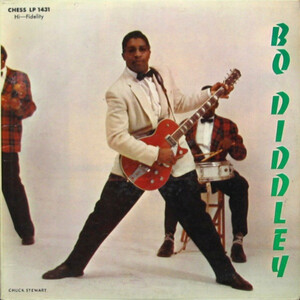
Bo Diddley is the debut album by American rock and roll musician Bo Diddley. It collects several of his most influential and enduring songs, which were released as singles between 1955 and 1958. Chess Records issued the album in 1958. In 2012, it was ranked number 216 on Rolling Stone's 500 Greatest Albums of All Time list alongside his second album, Go Bo Diddley (1959). The ranking of the album pair dropped to number 455 in the 2020 update of the list.

"I Wish You Would" is a song recorded by Chicago blues musician Billy Boy Arnold in 1955. It was developed while Arnold was performing with Bo Diddley and incorporates a Diddley-style rhythm. Called "a timeless Chicago blues classic", "I Wish You Would" is Arnold's best-known song and has been recorded by several artists, including the Yardbirds, who recorded it for their debut single in 1964.

"Smokestack Lightning" is a blues song recorded by Howlin' Wolf in 1956. It became one of his most popular and influential songs. It is based on earlier blues songs, and numerous artists later interpreted it.

"Train Kept A-Rollin'" is a song first recorded by American jazz and rhythm and blues musician Tiny Bradshaw in 1951. Originally performed in the style of a jump blues, Bradshaw borrowed lyrics from an earlier song and set them to an upbeat shuffle arrangement that inspired other musicians to perform and record it. Johnny Burnette and the Rock and Roll Trio made an important contribution in 1956 – they reworked it as a guitar riff-driven song, which features an early use of intentionally distorted guitar in rock music.
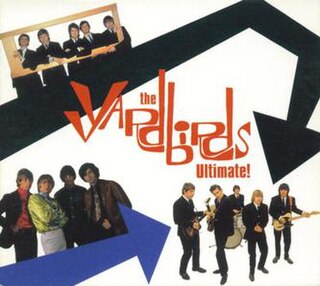
Ultimate! is a comprehensive career retrospective album by English rock group the Yardbirds. The 52-song two–compact disc compilation was released in 2001 by Rhino Records. The tracks span the period from the group's first demo recordings in 1963 to the last singles in 1968. They include all 17 of the group's singles, both A-side and B-sides, supplemented with more than a dozen album tracks, their performance for the film Blow-Up, and three early solo numbers by singer Keith Relf.

"Bo Diddley" is a song by American rock and roll pioneer Bo Diddley. It introduced the rhythm that became known as the Bo Diddley beat and topped the Billboard R&B chart for two weeks in 1955. The song is included on many of Diddley's compilation albums including Bo Diddley (1958) and His Best (1997). Buddy Holly recorded a version that became his highest-charting single in the UK.

"Heart Full of Soul" is a song recorded by English rock group the Yardbirds in 1965. Written by Graham Gouldman, it was the Yardbirds' first single after Jeff Beck replaced Eric Clapton as lead guitarist. Released only three months after "For Your Love", "Heart Full of Soul" reached the Top 10 on the singles charts in the UK, US, and several other countries.
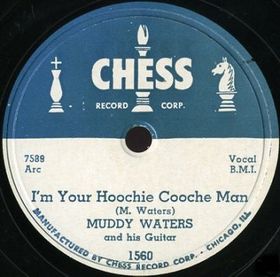
"Hoochie Coochie Man" is a blues standard written by Willie Dixon and first recorded by Muddy Waters in 1954. The song makes reference to hoodoo folk magic elements and makes novel use of a stop-time musical arrangement. It became one of Waters' most popular and identifiable songs and helped secure Dixon's role as Chess Records' chief songwriter.

"Who Do You Love?" is a song written by American rock and roll pioneer Bo Diddley. Recorded in 1956, it is one of his most popular and enduring works. The song represents one of Bo Diddley's strongest lyrical efforts and uses a combination of hoodoo-type imagery and boasting. It is an upbeat rocker, but the original did not use the signature Bo Diddley beat rhythm.

"Evil Hearted You" is a 1965 song by English rock group the Yardbirds. It was written by future 10cc member Graham Gouldman, who also wrote the group's two prior singles, "For Your Love" and "Heart Full of Soul". It reached No. 3 on the main UK singles chart.
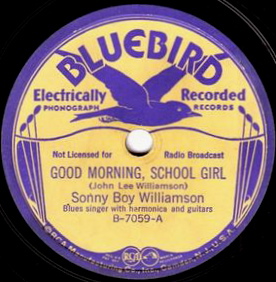
"Good Morning, School Girl" is a blues standard that has been identified as an influential part of the blues canon. Pre-war Chicago blues vocalist and harmonica pioneer John Lee "Sonny Boy" Williamson first recorded it in 1937. Subsequently, a variety of artists have recorded versions of the song, usually calling it "Good Morning Little Schoolgirl".

The Yardbirds are an English rock band, formed in London in 1963. The band started the careers of three of rock's most famous guitarists: Eric Clapton (1963–1965), Jeff Beck (1965–1966) and Jimmy Page (1966–1968), all of whom ranked in the top five of Rolling Stone magazine's list of 100 greatest guitarists. The band's other members during 1963–1968 were vocalist/harmonica player Keith Relf, drummer Jim McCarty, rhythm guitarist Chris Dreja, and bassist Paul Samwell-Smith, with Dreja switching to bass when Samwell-Smith departed in 1966. The band had a string of hits throughout the mid-1960s, including "For Your Love", "Heart Full of Soul", "Shapes of Things", and "Over Under Sideways Down".
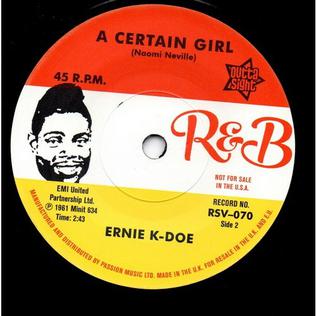
"A Certain Girl" is a rhythm and blues song written by Allen Toussaint, with the credit listed under his pen name Naomi Neville. New Orleans R&B singer Ernie K-Doe recorded it in 1961. Minit Records released the song as the B-side of "I Cried My Last Tear".





















